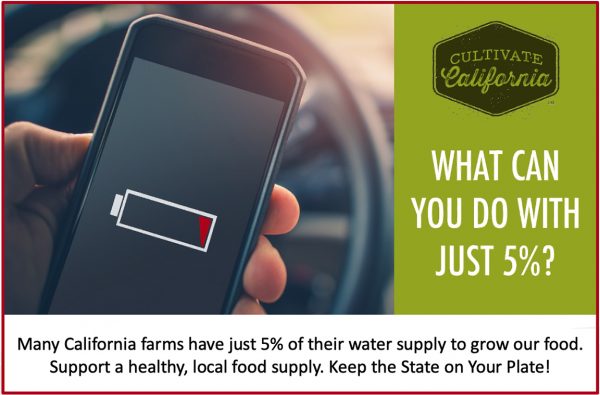Exceptional drought conditions mean Farm Credit’s support is crucial, as reminding people about link between water and their food is more important than ever
California is in the middle of one of its worst droughts on record. The federal government reports that showed that nearly half of the state – including the entire Central Valley – is in an exceptional drought as of mid-October. Overall, 2021 has been the ninth driest year in California since accurate records began being kept 127 years ago. Shasta Lake, the state’s largest reservoir, is at 23% of capacity and Lake Oroville, the second-largest reservoir, is at 22% of capacity.
 No one knows how long these dry conditions will last, but the most recent drought lasted for 376 weeks, from December 2011 to March 2019. And the National Weather Service currently forecasts that drought conditions are likely to continue in California as a weak La Niña effect will likely see storms diverted to the Pacific Northwest this winter. And all of that is bad news for California agriculture.
No one knows how long these dry conditions will last, but the most recent drought lasted for 376 weeks, from December 2011 to March 2019. And the National Weather Service currently forecasts that drought conditions are likely to continue in California as a weak La Niña effect will likely see storms diverted to the Pacific Northwest this winter. And all of that is bad news for California agriculture.
Which is why Cultivate California’s program aimed at educating Californians about the connection between consumers, the food they love and the water needed to grow it is so important as its messaging reaches 16 million people a year.
Mike Wade, the program’s executive director, said getting out early this year with messaging about water was essential to counter messaging from other groups.
“Californians continue to get inundated with negative messages about farming,” Wade said. “The Cultivate California program was designed to help bolster the natural support people have for agriculture and farms and to continue providing them with facts and information about the connection between their food and the water supply.”
The need to counter misinformation about farmers’ use of water is why Farm Credit has been one of the program’s largest donors since 2018, said Curt Hudnutt, president and CEO of American AgCredit.
American AgCredit, along with CoBank, Colusa-Glenn Farm Credit, Farm Credit West, Fresno Madera Farm Credit, Golden State Farm Credit and Yosemite Farm Credit, collectively contribute $100,000 a year to help Cultivate California inform Californians. The organizations are part of the nationwide Farm Credit System – the largest provider of credit to U.S. agriculture.
“This year, many California farms had just 5% of their water supply this year to grow our food,” Hudnutt said. “Cultivate California is one of the most successful groups we have to educate people about the impacts the drought has on our food supply, and the need to improve our water storage to protect all of us in future droughts, and we are proud to help support them in their efforts.”
Wade said one important message this year is that farmers and irrigation districts need to have flexibility to transfer water supplies to areas in greater need without burdensome red tape. And he said improving the state’s water supply system is crucial.
“We need to look long-term, which we should have done after the last drought,” he said. “Eighteen trillion gallons of water fell in February 2019 when the last drought ended, but we didn’t have the facilities to capture it and recharge our groundwater so we would have more supply available now. Hopefully our leaders will act so next time a drought occurs we will be better prepared.”
Rob Faris, President and CEO, Golden State Farm Credit, said it’s essential that more Californians are exposed to one of Cultivate California’s key messages – that the state’s farmers are producing more food but using much less water.
“The value of the state’s farm production increased by 38% between 1980 and 2015 while our farmers used 14% less water,” Faris said. “Farmers continually invest in irrigation technology, such as new drip and micro-irrigation systems, soil moisture monitoring, remote sensing, and computerized irrigation controls. Today, nearly half of our 8.4 million acres of irrigated farmland use drip, micro or subsurface irrigation, and more savings are on the way. Farm Credit is committed to help our members finance these improvements.”
Wade said Farm Credit’s support has been invaluable.
“The support we get from Farm Credit is amazing and critically important,” he said. “It has helped attract other supporters as well, and the support and leadership we get from Farm Credit has been instrumental in helping this program succeed.”
###
About Farm Credit:
American AgCredit, CoBank, Colusa-Glenn Farm Credit, Farm Credit West, Fresno Madera Farm Credit, Golden State Farm Credit and Yosemite Farm Credit are cooperatively owned lending institutions providing agriculture and rural communities with a dependable source of credit. For more than 100 years, the Farm Credit System has specialized in financing farmers, ranchers, farmer-owned cooperatives, rural utilities and agribusinesses. Farm Credit offers a broad range of loan products and financial services, including long-term real estate loans, operating lines of credit, equipment and facility loans, cash management and appraisal and leasing services…everything a “growing” business needs. For more information, visit www.farmcreditalliance.com.
About Cultivate California:
The Cultivate California program was formed following Governor Brown’s 2014 drought proclamation. It is an educational effort, composed of agricultural industry partners, designed to educate the public about the connection between farm water and our food supply, using media insights, social media analytics, paid advertising and fact-based myth-busting. Cultivate California is managed on behalf of its industry partners by the California Farm Water Coalition.






